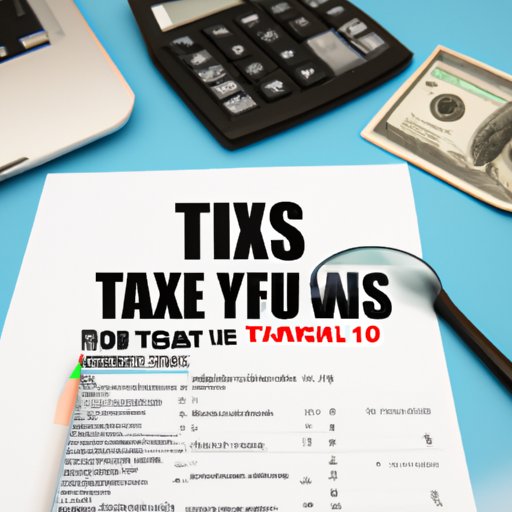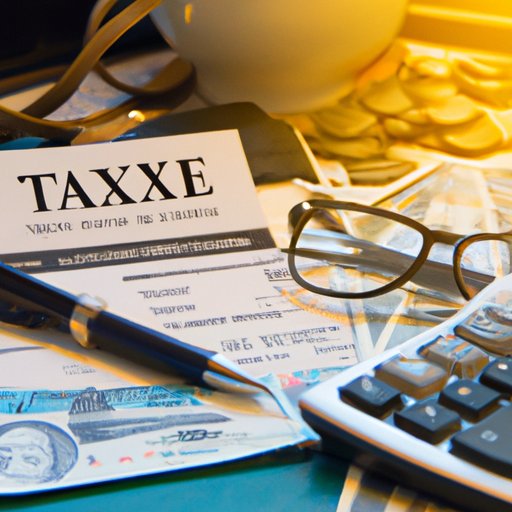Introduction
Travel expenses refer to the costs associated with traveling for business purposes. These expenses can include airfare, hotel accommodations, meals, transportation, and any other necessary costs related to business trips. Depending on your situation, you may be able to deduct some of these expenses when filing your taxes.
If you’re a business owner, understanding the rules and regulations around deducting travel expenses can be complicated. Knowing what expenses are deductible and how to claim them can help maximize your tax benefits from business travel. This article will provide an overview of tax deductions related to business travel and explain what types of travel expenses can be deducted, how to determine which expenses are deductible, and what documentation is required to deduct business travel expenses.

Explaining Tax Deductions for Travel Expenses
The Internal Revenue Service (IRS) allows businesses to deduct certain travel expenses as long as they meet certain criteria. Generally speaking, travel expenses are deductible if they are considered “ordinary and necessary” business expenses. The IRS defines ordinary expenses as those that are common and accepted in the industry, while necessary expenses are those that are helpful and appropriate for the business.
When determining which expenses are deductible, it’s important to consider the purpose of the trip. Generally speaking, only expenses related to business trips that are directly related to your trade or business are eligible for deduction. Any expenses related to personal trips, such as vacation or leisure activities, cannot be deducted.
The types of travel expenses that can be deducted vary depending on the type of trip. Common deductible expenses include airfare, lodging, car rentals, meals, tips, and entertainment related to business activities. It’s important to keep in mind that only the portion of the expense that is directly related to business activities is eligible for deduction. For example, if you pay for a hotel room but only use it for business purposes, you can only deduct the portion of the cost that was related to business activities.

What to Know About Deducting Business Travel Costs
In order to deduct business travel expenses, you must have proper documentation. The IRS requires taxpayers to keep detailed records of their business travel expenses, including receipts, invoices, and other documents. When reporting business travel expenses on your taxes, you must report the total amount spent on the trip as well as the amount that is deductible. You can either deduct the entire amount of the expense or just a portion of it, depending on the nature of the expense.
When claiming deductions for business travel expenses, you must use the appropriate forms. Generally, you should use Form 2106 for employees and Form 1040 Schedule C for self-employed individuals. You may also need to use other forms, such as Form 4562 for depreciation and amortization, depending on the type of expense you are deducting.
How to Maximize Your Tax Benefits From Business Travel Expenses
To maximize your tax benefits from business travel expenses, it’s important to keep track of all expenses related to the trip. This includes both deductible and nondeductible expenses. Keeping detailed records of your expenses will make it easier to calculate the amount of deductions you can claim on your taxes.
It’s also important to remember that there are limits to the amount you can deduct for business travel expenses. The IRS limits the amount of deductions you can claim for certain expenses, such as meals and entertainment. Additionally, you may not be able to deduct the full amount of certain expenses, such as airfare or hotel stays. To maximize your deductions, it’s important to understand the limits imposed by the IRS.
The Basics of Deducting Business Travel Costs
When deducting business travel costs, it’s important to understand what items are included in the expense. Generally speaking, business travel costs include airfare, hotel stays, meals, transportation, and any other necessary expenses related to the trip. In addition to these expenses, you may also be able to deduct certain costs, such as phone calls, internet access, and business supplies.
When calculating business travel expenses, you must determine the portion of the expense that is deductible. To do this, you’ll need to consider the amount of time spent on the trip, the purpose of the trip, and any other factors that may affect the amount of the deduction. Additionally, you must keep track of all receipts and other documents related to the trip in order to correctly calculate the deductible amount.
In addition to the actual costs of the trip, you may also be able to deduct certain expenses that are related to the trip. These expenses may include mileage, tolls, parking fees, and other costs associated with getting to and from the destination. Additionally, you may be able to deduct any interest paid on loans taken out to cover the cost of the trip.

Tips for Claiming Travel Expenses on Your Taxes
When claiming travel expenses on your taxes, it’s important to keep accurate records of all expenses related to the trip. This includes keeping track of all receipts, invoices, and other documents related to the trip. Additionally, you should organize your records in a way that makes them easy to find and refer to when filing your taxes.
When claiming deductions for business travel expenses, it’s important to remember any common deductions that may apply. These may include deductions for meals, entertainment, and other costs that are related to the trip. Additionally, if you are taking a business trip for multiple days, you may be able to deduct a portion of the cost of your airfare.
Finally, it’s important to remember that there are limits to the amount of deductions you can claim for business travel expenses. The IRS limits the amount of deductions you can claim for certain expenses, such as meals and entertainment. Additionally, you may not be able to deduct the full amount of certain expenses, such as airfare or hotel stays. To maximize your deductions, it’s important to understand the limits imposed by the IRS.
Deciphering the Rules for Deducting Travel Expenses for Work
The rules for deducting travel expenses for work can be confusing and complex. To ensure you’re following the rules, it’s important to read through the Internal Revenue Service’s (IRS) regulations regarding travel expense deductions. The IRS has published guidelines that provide information about what types of expenses are deductible, how to calculate expenses, and what documentation is needed to deduct business travel expenses.
When reading through the IRS regulations, it’s important to look for any rules or restrictions that may apply to your particular situation. Additionally, it’s important to make sure you’re complying with all applicable laws and regulations. Failing to comply with IRS rules could result in penalties or other consequences.
Conclusion
Understanding the rules and regulations around deducting travel expenses for work can be complicated. However, knowing what expenses are deductible and how to claim them can help maximize your tax benefits from business travel. When claiming deductions for business travel expenses, it’s important to keep detailed records of all expenses related to the trip, use the appropriate forms when filing your taxes, and understand the limits imposed by the IRS.
(Note: Is this article not meeting your expectations? Do you have knowledge or insights to share? Unlock new opportunities and expand your reach by joining our authors team. Click Registration to join us and share your expertise with our readers.)
